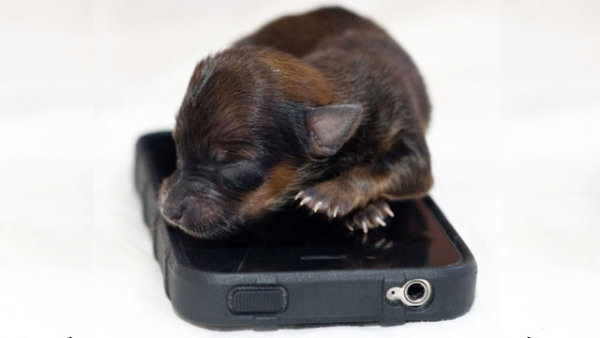While no one outside of Apple's inner circles know what it will be called — iPhone 5, new
iPhone or something else altogether — all signs point to a new device on the market by the third week of September.
Between leaked photos out of Asia, patent filings, Foxconn CEO
comments (the Chinese manufacturer responsible for building Apple's
products), cellular carriers clearing stock of the iPhone 4S (and
telling employees
not to take a vacation
between Sept. 21 through 30), it's pretty certain the iPhone 5 — let's
just call it that for the time being — will be available in a month's
time.
The new phone is expected to be officially announced on September 12,
when preorders would also start, and available about a week later.
And let's face it: there's a lot riding on this release for Apple —
now the most valuable company in history at more than $619 billion — to
keep its momentum going in the right direction. By some analysts'
predictions, Apple could be the world's first "
trillion-dollar baby" if the new
iPhone, a possible iPad mini and an
iTV product all succeed.
, so what's the iPhone 5 going to have, you ask? A lot, by all
accounts -- and we're not even referring to what's confirmed to be in
the upcoming
iOS 6 operating system. Let's take a look at what we know and what we think we know.
Bigger screen
It's not likely to be as big as the
Samsung Galaxy S III's
4.8-inch display, but iPhone 5 will likely have a bigger screen than
the 3.5-incher we've been staring at on the iPhone since it launched
in 2007. According to
photos leaked to MacRumors.com
a few days ago, the new iPhone might be about 14 percent bigger, up to 4
inches in diameter. That's not a significant bump up in size, mind you,
but certainly better for web browsing, messaging, ebooks,
GPS navigation,
games and video (in fact, the increase will likely change the aspect
ratio from 3:2 to a widescreen 16:9). Apple will also pack more pixels
on the taller screen, to ensure it's still a "Retina" display -- meaning
its pixel density is so high the human eye is unable to distinguish
individual dots.
Thinner body, bigger battery & new connector
The new screen — likely to be one of the biggest features in the
iPhone 5 — will also be thinner, contributing to an even svelter
smartphone. Apple was recently awarded a patent related to integrating
touch sensors with the actual display circuits, opposed to placing the
touch sensors on top of the LCD screen (currently, the way it's done).
This will result in a thinner display, expected to trim the entire
iPhone's depth by about 1.2mm.
On a related note, rumor has it the iPhone will have an all-new housing with a full
metal back, replacing the breakable glass on the iPhone 4S.
As for the connectors, it seems the headphone jack has been moved
from the top left of the phone to the bottom left, beside a small
connector —
8- to 19-pin, allegedly
— compared to the wide-mouth 30-pin connector in the current suite of
iOS devices (iPhone, iPod touch, iPad) and the Apple nano, too. Unless
there's an adaptor in the box to support the many thousands of
accessories on the market, such as
speaker docks,
this change might frustrate current Apple customers. Apple is changing
to this smaller dock connector on all future iOS products, various
sources say.
On the subject of hardware, it's no secret the iPhone 4S battery is
less than ideal for all of the phone's power-draining abilities. A
leaked photo acquired by 9to5Mac
points to a bigger battery in the iPhone 5 — but not by much. The
current iPhone 4S sports a 1,430mAh battery (up from 1,420 mAh on the
iPhone 4), and this photo shows a slightly better 1,440mAh battery, and
upping to 3.8 volts from 3.7.
Let's just hope the new battery doesn't get as hot as the new iPad -- or take as long to charge it up.
New wireless tech
Speaking of smaller, there's talk (
and photos)
of a new nano SIM under the hood of iPhone 5 to give the iPhone
cellular connectivity. Apple has been pushing for this as a standard for
some time, so we'll soon see if iPhone 5 is the first to house this new
SIM card.
Other changes to its wireless capabilities include 4G/LTE data speeds
which take full advantage of the faster wireless networks available in
select markets. For the uninitiated, "Long Term Evolution" cellular
speeds rival if not exceed broadband Internet connections at home thanks
to download speeds that top 72 Megabits per second -- though this
number is "theoretical" opposed to slower "real world" performance. In
areas without LTE support, the iPhone 5 would revert to HSPA+ (up to 21
Megabits per second downloads) or depending on the carrier, dual-carrier
HSDPA for download speeds of up to 42 Megabits per second.
Already in the new iPad, LTE support in the iPhone 5 is extremely likely. That, and the
Korea Times
says Apple has been in discussions with two Korean mobile carriers (SK
Telecom and KT) to include iPhone 5 on their LTE networks.
While not as likely as LTE, the iPhone 5 might also include
near-field communication (NFC), a small wireless radio that essentially
turns the smartphone into a digital wallet. This would allow iPhone
users to tap-and-pay at supporting retailers and vending machines.
Similar to Google Wallet, an iWallet app would be linked to your credit
card or bank account. There are other applications for NFC-based
smartphones, too, such as easily exchanging information with another
smartphone, swiping to access information or media (such as poster of a
movie to download a trailer) and to get on a bus or in your condo.
Apple recently acquired AuthenTec,
a digital security company that makes, among other things, fingerprint
sensors used in laptops. MacDailyNews suggests the fingerprint reader
could be
embedded in the Home button. Cool.
With all of these unknowns, here's one think you can bank on:
whatever the new iPhone will be called, whenever it'll be available and
regardless of what it can do, this will be the biggest tech event of the
year -- and perhaps propel Apple towards being the first thirteen digit
company. iOutstanding.
source





























































